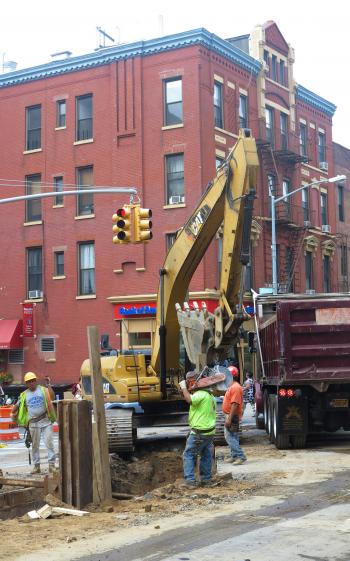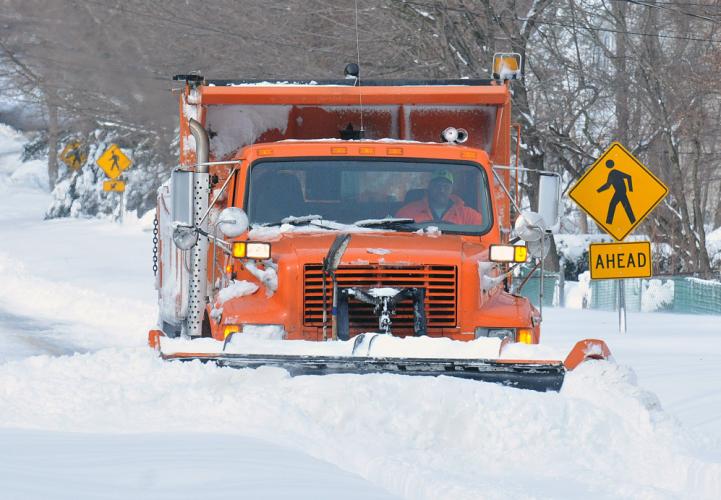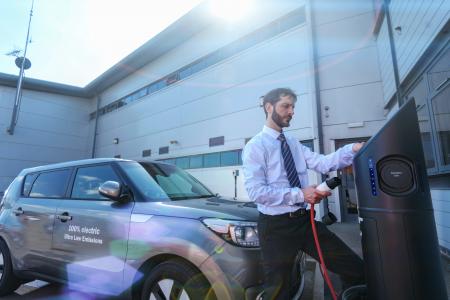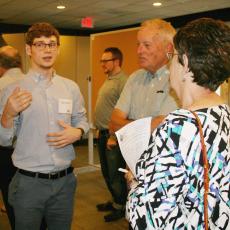In Our Spotlight
Greening Municipal Fleets
What do Big Cities, Small Cities, and Rural Towns Have in Common?
What they have in common are lots of cars and trucks (and backhoes and ambulances and vans) that need regular feedings of gas (and money) to do their jobs.
Transportation is one of the largest sources of municipal energy consumption for all those big cities, small cities and rural towns in Massachusetts. What choices do municipalities have? Carole Collins, energy and sustainability manager in the small Franklin County city of Greenfield, says, “Fleet vehicles are the toughest nut to crack because there are limited options.”
 Researchers who work in the Clean Energy Extension (CEE) program at the University of Massachusetts Amherst are attempting to help communities throughout the state to reduce expenses and emissions associated with vehicle use. It’s a big challenge.
Researchers who work in the Clean Energy Extension (CEE) program at the University of Massachusetts Amherst are attempting to help communities throughout the state to reduce expenses and emissions associated with vehicle use. It’s a big challenge.
We’re from UMass; How Can We Help?
In order to help municipalities cut costs and achieve greater fuel efficiency, Clean Energy Extension has conducted research to identify obstacles to reducing fuel-use. Undergrad intern Dugan Becker, (’19) interviewed many town fleet managers asking, “What is holding you back from reducing fuel use? How can we help?” As a result of his research and fact-finding, Becker took the lead on compiling a series of fact sheets that describe strategies and technologies which are very achievable by Massachusetts communities. They are designed by topic (e.g. strategies to reduce fuel use in municipal fleets, idle reduction technology, telematics software, alternative fuels, hybrids and electric vehicles) to help town fleet managers run their trucks, heavy-duty plows and town cars more efficiently.
Can Your Town’s Fleet Manager Be a Local Hero?
When you are shopping for a personal new or used car, you likely go right to the place that tells you how many miles per gallon to expect. Newer fuel-efficient vehicles can save you thousands of dollars in gas money over the years. So you might expect when your town’s old snow plow truck needs to be replaced, the fleet manager would also check miles per gallon to help decide on make and model for purchase. It may surprise you to learn that manufacturers are not required to share fuel economy for heavy-duty vehicles over 8,500 pounds, so your town’s shiny new snow plow may unknowingly be a gas hog.
Enter the first suggestion for fleet managers from CEE research: track your fuel consumption. Drivers can keep a simple fuel log or install vehicular telematics software. A telematics system utilizes a combination of GPS technology and on-board diagnostics to monitor the location and performance of an individual vehicle or a municipal fleet. This process of sending, receiving, and analyzing vehicular data can highlight potential areas of improvement within a fleet, as well as further ensure the secure use and safe operation of municipal vehicles. Data is recorded and uploaded to an online database. Information is gathered on speed, distance travelled, rates of acceleration and deceleration, idling times and on-board diagnostics.
Data collected through telematics can help communities in a number of categories:
- Cost Savings: By highlighting and avoiding wasteful driving habits such as excessive idling, hard braking, and quick acceleration, fuel usage can be reduced by up to 33%, saving money. Many telematics systems provide maintenance reminders which can ensure that each vehicle is performing optimally, increasing fuel efficiency by up to 9% and avoiding costly repairs later on.
- Convenience: Automated record keeping eliminates the need for time-consuming paperwork, such as Driver-Vehicle Inspection Reports (DVIRs) and trip histories. For larger fleets, real-time GPS monitoring can allow fleet dispatchers to identify which vehicle is closest to a given destination, potentially reducing response time, especially in the case of an emergency.
Actions That Rural Towns Can Take To Reduce Fuel Costs
This fact sheet provides a walk-through of concrete actions that can be taken to lessen the burden on costs to operate and maintain town vehicles. Additional fact sheets offer more information about related topics, we suggest your read them all. For example, a few strategies include the following:
- Increase efficiency of new or existing vehicles. The Massachusetts Electric Vehicle Incentive Program (MassEVIP) helps eligible public entities acquire electric vehicles and install charging stations for their fleets. Or a hybrid retrofit may be a good match if the vehicle is needed for towing and other utility capacities. For example, Massachusetts-based company XL Hybrids offers a system to convert conventional vehicles (e.g. Ford F150 or F250) into hybrids, improving the fuel economy by as much as 50%. For more information click here.
- Install Idle Reduction Technology (IRT) systems. IRT is equipment that can be installed in vehicles and heavy duty machinery to reduce or eliminate long periods of idling. Due to the versatility of IRT systems, nearly any vehicle can be equipped with some form of anti-idle technology. According to the U.S. Department of Energy, idling a vehicle for one hour can burn up to one full gallon of fuel. Over the course of weeks, months, or years, unnecessary idling can have a damaging and costly impact on vehicles.
IRT systems provide 3 main benefits: reduced fuel consumption; reduced engine wear - extended vehicle life & reduced maintenance costs; and reduced vehicle emissions. Argonne National Laboratory maintains a list of available Idling Reduction Equipment on its website.
Benefits in real time: Millville reported that their vehicle equipped with the anti-idling technology could run the heat for eight hours without turning on the engine. Both Millville and Sherborn reported being able to extend the life of their vehicles with anti-idling technology due to reduced wear and tear and being able to install the technology on older vehicles instead of having to buy new ones.
A Tale of Two Communities: Adding Electric Vehicles
Suzanne Szyndlar, town administrator, Rochester, says, “Rochester has been pleased with the cost savings and sustainability impacts of adding the EVs to its fleet, and the municipal officials who drive them have taken every opportunity presented to talk about the benefits of EVs with townspeople.” Rochester has three electric vehicles and two charging stations. They have saved $1,200 in gas savings over 1.5 years and avoided GHG emissions totaling 10,345 pounds over 1.5 years.
Just ten miles down the road, New Bedford (population 95,032) shares a huge success story, especially since turning over several new (Nissan) LEAFs. Sited on the southeast coast, residents are highly motivated to green up since they face real dangers of sea level rise. City officials were early adopters of measures to combat climate change and to save money. In 2015, they rolled up their sleeves to work with MassEVIP to replace their aged vehicles, since these clunkers were spending more time in the repair shop than on the road. Now, with its 23 Nissan LEAFs and 30 charging stations, approximately 30 percent of New Bedford’s passenger fleet is full battery electric and supports the City’s initiatives to incorporate clean energy technology. To charge up the entire 23 vehicle fleet for one month costs $620, which is significantly less than the thousands of dollars in maintenance costs and upkeep the old vehicles required. The EVs have saved New Bedford the equivalent of about 7,634 gallons of gasoline over three years, translating to $17,329 saved at the pump, and avoiding the release of 149,567 pounds of greenhouse gas (GHG) emissions.
Interesting fact: Many small rural towns in the state only own a few town vehicles. Their municipal fleet might include a police car, a fire truck, a snowplow and a dump truck. On the other hand, Boston maintains a fleet of over 3,100, while Springfield owns over 600 vehicles and Worcester has nearly 2,500 vehicles. With a population of 337, tiny Hawley in a remote area of Franklin County, maintains nine vehicles.
Portrait of a Future Energy Leader?
 Dugan Becker, UMass Amherst ’19, has a grasp of complex clean energy issues that belies his years. In 2018, he was chosen as a CAFE Summer Scholar to collect data that resulted in recommendations for reducing municipal vehicle fuel consumption in rural Massachusetts towns. Dugan has taken the lead on authoring a 40+ page analytical report and has developed five fact sheets (with a sixth coming soon) for transportation professionals who work in small communities, offering concrete steps they can take to save fuel and money. Dugan got his feet firmly planted in the environment at a young age. He said, “I was always an outdoorsy kid growing up near woods, appreciating nature and camping. The broad field of the environment was what brought me to UMass. My father was heavily involved on town boards and conservation efforts. As a young kid, I watched him and his activism deeply affected me and guided my academic interests.”
Dugan Becker, UMass Amherst ’19, has a grasp of complex clean energy issues that belies his years. In 2018, he was chosen as a CAFE Summer Scholar to collect data that resulted in recommendations for reducing municipal vehicle fuel consumption in rural Massachusetts towns. Dugan has taken the lead on authoring a 40+ page analytical report and has developed five fact sheets (with a sixth coming soon) for transportation professionals who work in small communities, offering concrete steps they can take to save fuel and money. Dugan got his feet firmly planted in the environment at a young age. He said, “I was always an outdoorsy kid growing up near woods, appreciating nature and camping. The broad field of the environment was what brought me to UMass. My father was heavily involved on town boards and conservation efforts. As a young kid, I watched him and his activism deeply affected me and guided my academic interests.”
Dugan’s work at UMass has helped identify barriers that prevent small towns from implementing changes that would help their bottom line. In addition to reducing harmful greenhouse gas emissions, the work can save rural communities money: a welcome outcome for officials trying to stretch small budgets.
He spent his last semester working with several rural communities who have agreed to install telematics devices in a range of 45 municipal vehicles to collect real-time data on fuel economy and route optimization.
Post-graduation, Dugan plans to work at the Mount Ida Campus of UMass Amherst (in Newton) to conduct a greenhouse gas inventory and clean energy plan as part of a larger team. He will analyze existing buildings along with their fuel consumption then draft a plan for the University to provide information on what steps should be taken to improve efficiency. Improvements could include adding insulation, boiler upgrades or other measures. Dugan’s strong work ethic, combined with his aptitude for energy and policy research, makes him a rising (and, ahem, energetic) star.


